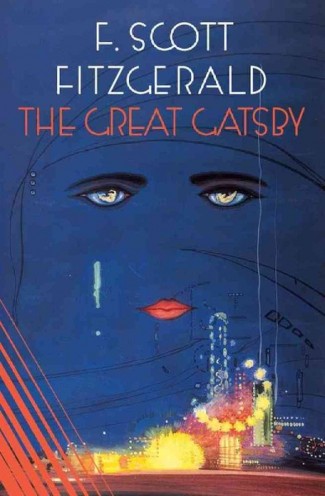Berwyn, PA. I was a little surprised, not too long ago, to hear a student mention that The Great Gatsby was her favorite book. “Because it is the only book you have read,” flashed through my mind, before I could shut up the red-faced misanthrope who accompanies me through my days. I have seen enough of contemporary undergraduates to know that they do read — oh, they do indeed — but only if instructed to do so in order to prepare them for some specific form of assessment that will end in a credential they can list on their curriculum vitae (Harry Potter? Well, that must be read to prove one’s bona fides as a Millennial). But, no, in this case the ruddy misanthrope was wrong, and was well advised to turn his bar stool back round and continue toasting Jason Peters’ health with a long pour of rye on the rocks. There was something else at stake in that student’s love — something that I found mysterious.
For, while I always admired F. Scott Fitzgerald’s success at straddling the border between celebrity and genius, literary realism and a lyrical modernism (the modernism that might have been, as opposed to the modernism that was), I never quite understood why Gatsby occupies the place it does in so many persons’ imaginations, their canons of youthful affection. If one reads Dostoyevsky young enough, certain tastes tend to become incomprehensible; I was unconscious of that truth until my early twenties, when a friend of mine, an admirer of Henry James, looked on me with sorrowful eyes, after I referred to Dostoyevsky as the greatest of novelists. “It is all just so sordid,” he replied, giving me my first lesson in the probability that morality is a matter of style, or rather, that form is essence.
If form is essence, then our experience of seeing the form of things will always lead us to a decision. The forms we perceive — the things we see, understand, and take for reality — may be merely sensible, or, at least, mere appearance. They conceal nothing behind themselves; they are a veil over the abyss, and all searching for truth is destined to come back empty. The truth is so shallow that it wears off like the rubbings from a lottery ticket. Form may be the sole reality, it may be a thin veil, but it may also seem splendid, like a skein of silk. It may radiate in the light of our eyes. And then, all the little things we see in the world take on a kind of coruscating and absolute quality. More often than not, the forms that appear to us seem not like veils concealing the dark of despair, but like gods and goddesses immediately and self-evidently worthy of our brief, but sincere, worship. Much of the time, that is, our encounter with the world seems to offer us a choice between nihilism or idolatry.
Form offers us another possibility, a familiar possibility, as well of course. It is a hieroglyph, a manifestation, an appearance of reality, a container of reality, but not the Real itself. What we see with the senses and think with our minds are forms-as-words, spoken by a reason that gives itself in those words after the fashion of a promise: the things you see are meaningful, that is, they are real signs of a reality that lies beyond them, and you only know those individual things when you come to see them not as veiling the abyss but as glimmering from the depths of a fullness that is truth and love.
The trouble with this last possibility is that it holds true whether we give our assent to it or not; we cannot test experimentally what it would be like to withhold meaning from form, but can only will ourselves to pretend that it is so. And, for many of us, that seems the easiest thing to do. We exclude the possibility of logos, of a form-giving logic beyond all form, in favor of willing ourselves into despair or to letting our concupiscence simply lead our simple souls to disport themselves among the shining gods littering the universe. Our will can exercise this freedom to deny the form-given quality of reality even as it remains trapped, at every instant, as the beneficiary of it.
I do not think I have ever seen a writer confront this condition with so much comprehension and compassion as has Emily Stimpson in her review of the film of The Great Gatsby. Her account of the film, its merits and its weaknesses, is perceptive and elegant; her grasp of why Gatsby rendered as absolute spectacle should appeal to Millennials would seem ingenious did it not at once become just plain obvious through her lucid explications:
The film, like the book, shows a world powered by greed, electrified by sex, and running like hell from grief. That world doesn’t want to remember the trenches of Verdun or the shores of Gallipoli. It doesn’t want to ask why millions of young men had to die or what good came from their deaths. By 1922, all searches for meaning in the madness of World War I had come back empty. So people stopped searching. Instead they started grasping—at pleasure, at excitement, at anything that promised to distract them from the wounds they bore within them.
“The Great Gatsby” makes that world incarnate. It also makes incarnate an age of unprecedented wealth, of clothes and cars and cheap electricity. In 1922, almost everything could be had for a price. The age of the consumer had begun, and along with it, the growing belief among the middle class that luxury could be had without work.
At the center of that world, embodying it all, stands Gatsby, a romantic, a dreamer, a man who thinks himself “the son of God” and who believes his destiny is to climb as high as the stars, always moving upwards, capable of anything, even repeating the past.
How could that not speak to twenty-somethings?
Today’s under-30 crowd has grown up in an age of endless war—wars in deserts abroad and in the culture at home. Those wars have left many of them wounded, in soul if not body. Those same wars also have left Millennials cynical about politics and cynical about love. Irony is the spirit of the age.
With all those wounds and all that cynicism, the Millennials know, far too young, what it is to run from grief, drink away confusion, and settle for sex when real love can’t be found. They’ve been to the parties and danced the dances. Or they’ve watched their friends dance them. They also know, in a way T.S. Eliot couldn’t have fathomed, what it means to be “distracted from distraction by distraction.”
Likewise, today’s twenty-somethings know excess. Forget the Lost Generation. No generation before the Millennials has had as much or had it so quickly. They have never known a world without Amazon One-Click or iTunes. They have lived the whole of their existence as consumers, swimming in a sea of stuff.
Last but not least, like Gatsby, Millennials want to shine. In fact, as a generation, they believe they were made to shine. No demographic in the world scores as high on the narcissism index (yes, that’s a real thing) as Millennials. What Gatsby came by naturally has been instilled in them through the instant fame promised by Reality TV, and two decades of “I am special” curricula in schools.
In sum, Gatsby’s world is our world … albeit with fewer smart phones and better clothes.
Accordingly, whether they’re wounded or witnesses to wounds, consumers or critics of consumerism, dreamers who believe in love or skeptics grown cynical from disappointed love, there’s something in “The Great Gatsby” to which just about every Millennial can relate. It’s the story of their generation, almost as much as it is the story of their great-great grandparents’ generation, albeit in a more elegant package (which itself is another reason for its appeal—most Millennials only regular encounter with elegance being a MacBook Pro).
Stimpson admires the film, for it reveals how forms shine out. The things of this world seem to clamor for our love, and we find that love irresistible because it seems to be the only one that will not abandon us before we can abandon it. But, these things are a disappointment and a cheat. There is a better, because truer, way, writes Stimpson:
The truth is that Gatsby wasn’t hopeful: He was delusional. He manufactured a life, and he manufactured a love, fabricating an identity for himself just as he fabricated an ideal woman from his memories of a real woman. He created a false picture of their love in his mind, then refused to see ther eality before his eyes—the reality of her littleness and betrayal—because it wasn’t what he wanted to see.
Everything Gatsby’s age promised, everything Gatsby sought, disappointed in the end. Wealth, Power. Pleasure. Romance. All that burning and blazing came to nothing, a nothing encapsulated by the bullet which pierced Gatsby’s chest.
The reason for that end, as my friend Chris said to me afterwards, is this: “Pretentions to divinity always end in death.”
You see, we are called to greatness, each and every one of us. We are called to be sons and daughters of God. That instinct—in Gatsby, in Millennials, in anyone—isn’t wrong. But power, wealth, and fame don’t make a person great. Love does that—love for God and love for one another. Likewise, we’re not born sons and daughters of God. We’re made that way by baptism. It’s a gift, not a given.
If we assume the gift without realizing how gracious it is, and then pursue greatness by trying to blaze through the sky on an ever-upward trajectory, we will crash and burn. There will be no life. There will be only death.
If it’s life we want, then it’s love we need to pursue—not the type of self-seeking, self-satisfied love the world glorifies, not the type of love which looks to another human person for meaning and fulfillment—but love which denies itself for the sake of the other and which knows true fulfillment and meaning can be found in only one Person, Jesus Christ.
The way to that love is narrow, not wide. It’s easy to blaze through the sky. It’s difficult to lay oneself low, to be little and humble and meek, to seek to serve rather than be served, to affirm rather than be affirmed. There’s scant glamor in that way, but in the end, it’s the only way worth taking.
Why would we will there to be nothing? Why would we will the little pleasures that bewitch our moments to be everything? Well, our will flails in every direction unless we silence it so it may wait for the word of reason to teach it where to go. How hard it is not to pronounce emptiness or to pounce on those treasures ready to hand! How many lives are ruined by the fact that these two possibilities cleave so closely together. And yet, how hard it is to look at the things of this world not as money in one’s purse but as words of promise whose fulfillment seems to be, at best, seedlings hidden in dark soil.
Perhaps that is why Dostoyevsky seemed so sordid to my friend. There was nothing good in his books if one was not willing to go down in the dirt, down in the filth, and wait for rebirth. There are seeds planted in Fitzgerald’s books, as well. In fact, I have come to think they may be more promising insofar as they show the place where light and darkness meet, and where the little shiny idols of the world seem to crowd in and rub shoulders with the Christ. Morality is a matter of style; not in the sense that we may each pursue our unaccountable tastes, but in the sense that what is true and good forms us as it forms all things. We are called not to reject appearances, but to settle for nothing less than letting ourselves be reformed by the light that first makes things to shine.
You can read Stimpson’s whole review here.






4 comments
Ray Olson
Good of you to post this, Mr. Wilson, and to quote so much of Ms. Stimpson’s review. Reading the rest of the latter, I was particularly struck by what follows from where your quotation leaves off (viz., “It’s difficult to lay oneself low, to be little and humble and meek, to seek to serve rather than be served, to affirm rather than be affirmed. There’s scant glamor in that way, but in the end, it’s the only way worth taking”):
“Gatsby never saw that. He was a fool. Fitzgerald saw some of it. He at least knew Gatsby was a fool. He knew the whole spirit of his age, a spirit in which he nevertheless fully imbibed, had it all wrong. But he didn’t know how to get it right.
“We do. The Church has handed it to us on a platter.”
This sounds correct to me. But as the friend of so many bitterly self-separated Catholics who are as much at odds with the materialist spirit of our age and who as firmly affirm the virtues of meekness and service as any FPR contributor or admiring respondent, I wince at how poorly the personnel of the Catholic Church in the U.S. modeled meekness and service to the laity of my generation (the baby boom), at least. These ex-Catholics got the message but concluded that the messengers were–though not uniformly, I hasten to state and to emphasize as strongly as possible–in practice authoritarian and dominating. Perhaps Fitzgerald’s experience was similar, which might explain why The Great Gatsby is, as I recall it, so resolutely a-Christian.
JimWilton
I appreciate this excellent essay very much but also agree with both comments above.
It is fascinating to trace cause and effect from one generation to the next as we (as a culture) are blown by winds of desire to accumulate pleasure and avoid pain. The trauma of WWI leads to nihilism and the excess of the 1920s. The bubble of the 1920s leads to the Great Depression of the 1930s. The Great Depression of the 1930s leads to fascism, the rise of communism and WWII. The horrors of WWII leads to a withdrawal into the conformity and consumerism of the 1950s (quite different from the 1920s). The conformity of the 1950s leads to the Beat generation and the political activism of the 1960s. The failure of the revolution of the 1960s and disillusionment with politics (Watergate, etc.) leads to the “me” generation of the 1980s, the Reagan era and the conception of America as the sole world power as well as an uncritical embracing of capitalism and an arrogant vision of America as the pinnacle of social and political evolution. The hubris of the Reagan era leads to a backlash, wars in the Middle East, and the war on “terror”. The war on terror leads to curtailment of individual liberties and growth of unrestrained governmental power. The rise of corporate culture and big government leads to the Front Porch Republic, the Tea Party and the Occupy movement.
Admittedly, it gets a little murkier as we get closer to the present and it becomes more difficult to tag the diversity of an age that we have lived through with simplistic labels. I do think that “distracted by distraction from distraction” is one of the chief characteristics of the current age. I am reasonably optimistic that as we get more materialistic and immersed in fantasy — that attraction of simplicity and a yearning for genuineness will become in equal measure more powerful.
Chris Schumerth
“There was nothing good in his books if one was not willing to go down in the dirt, down in the filth, and wait for rebirth.” I have noticed this trend as a difference between the lifestyles and cultural criticisms of a sincere Christian or even a non-Christian Front Porch-type (I assume there is such thing, am I right?) and the mainstream. To say the things we say, we are “always so negative.” Why can’t we focus on the positives for once? Well, seeing what’s really there IS dark and depressing and scary and evil in so many instances. Which is why we desperately need grace. But to acknowledge our need for grace is to admit that we aren’t our own gods, which is a concession so few people are ready to make.
Brian
“Today’s under-30 crowd has grown up in an age of endless war—wars in deserts abroad and in the culture at home. Those wars have left many of them wounded, in soul if not body. Those same wars also have left Millennials cynical about politics and cynical about love.”
This is a very strange point to make, and not elaborate upon. A whole bushelful of dissertations could be written on this topic, I think. The youth of the post-WWI age had mostly actually been sent off to war, and actually experienced the horrors of the trenched. The youth of today have mostly sat on their butts and watched pundits of their parents’ and grandparents’ generation argue about war. A cynic of 1920 would laugh at a cynic of 2013 and say, kid, you ain’t got a thing to complain about, you ain’t seen NOTHIN’. I’m not about to go on a rant against “what’s wrong with kids these days?” but the lines quoted above in particular really cry out for a whole lot more thought and analysis about what’s changed in the last century.
Comments are closed.